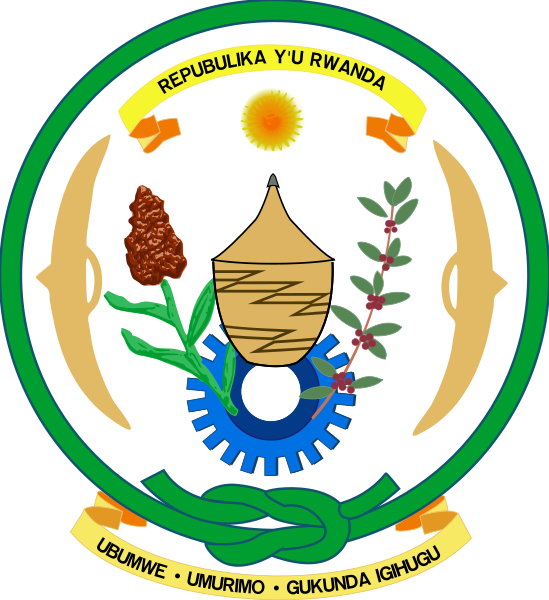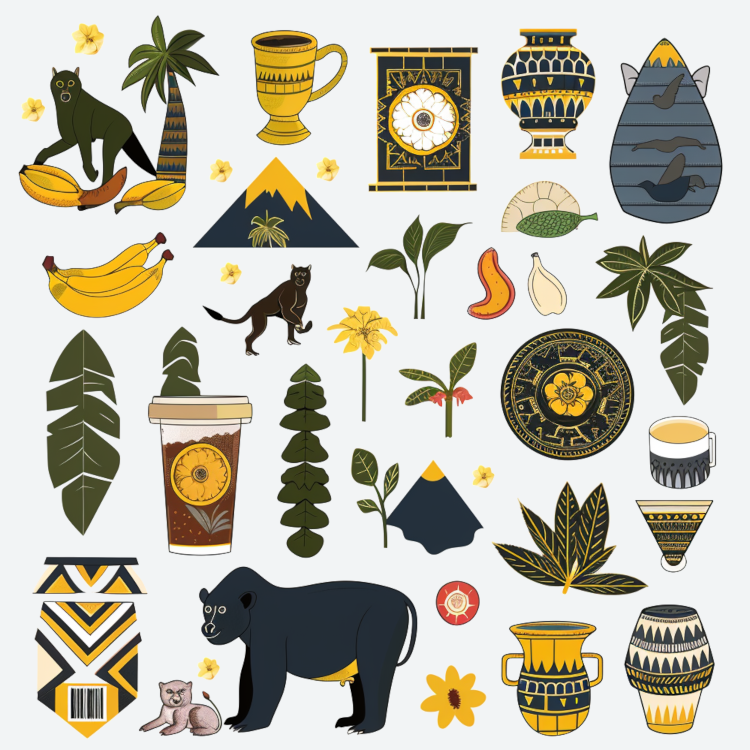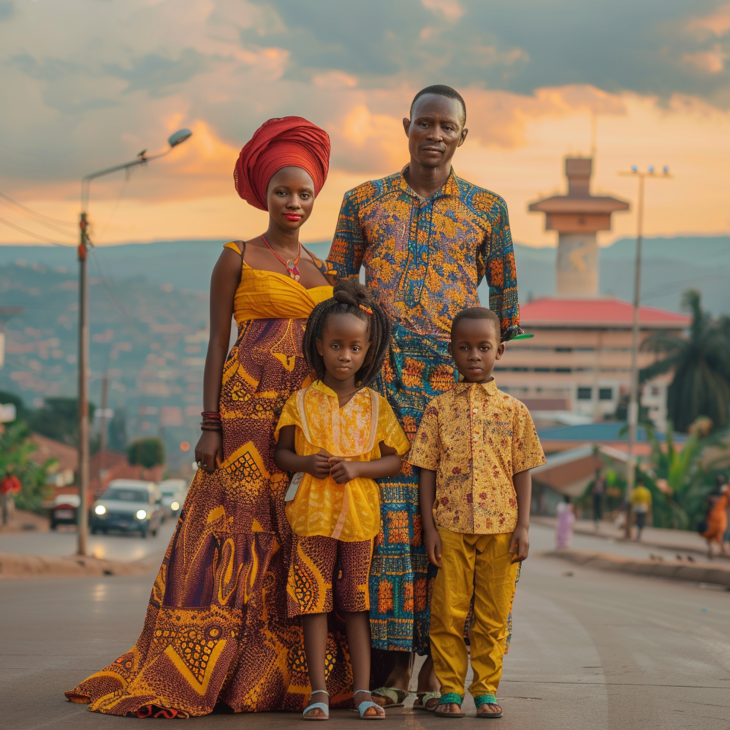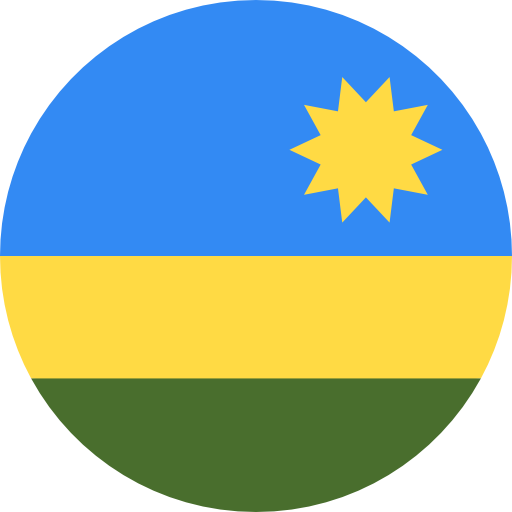About RW

Location
Rwanda is a landlocked country located in the Great Lakes region of East Africa. It is bordered by Uganda to the north, Tanzania to the east, Burundi to the south, and the Democratic Republic of the Congo to the west.
Capital
The capital city of Rwanda is Kigali.
Population
As of the latest estimates, Rwanda has a population of approximately 12.6 million people.
Area
Rwanda covers a total land area of about 26,338 square kilometers (10,169 square miles), making it one of the smallest countries in Africa.
Official Language
The official languages of Rwanda are Kinyarwanda, French, and English.
Government
Rwanda is a unitary semi-presidential republic with a multi-party political system. The President of Rwanda serves as the head of state and government, while the Prime Minister is the head of the Cabinet.
Independence
Rwanda gained independence from Belgium on July 1, 1962.
Currency
The currency of Rwanda is the Rwandan franc (RWF).
Economy
Rwanda's economy is primarily based on agriculture, with coffee and tea being significant export crops. The country has also made strides in diversifying its economy, with sectors such as tourism, manufacturing, and information and communication technology (ICT) growing in importance. Rwanda has been praised for its economic reforms, business-friendly policies, and efforts to attract foreign investment.
Natural Features
Rwanda is known as the "Land of a Thousand Hills" due to its mountainous terrain and scenic landscapes. The country is home to several national parks, including Volcanoes National Park, where tourists can trek to see endangered mountain gorillas.
Culture
Rwandan culture is rich and diverse, with influences from the country's various ethnic groups, including the Tutsi, Hutu, and Twa. Traditional music, dance, and art are important aspects of Rwandan culture, often used to convey stories, history, and social values.
Genocide
Rwanda is unfortunately known for the genocide that occurred in 1994, during which an estimated 800,000 people, predominantly Tutsi but also moderate Hutu, were killed in 100 days. The genocide had a profound impact on Rwanda's history, society, and economy.
Infrastructure
Rwanda has made significant investments in infrastructure development, including roads, airports, and telecommunications. The country has also invested in improving access to healthcare and education, with notable progress in reducing child mortality and increasing school enrollment rates.
International Relations
Rwanda is a member of various international organizations, including the United Nations, the African Union, and the Commonwealth of Nations. The country has played an active role in regional peacekeeping efforts and has contributed troops to United Nations peacekeeping missions in various countries.
Environmental Conservation
Rwanda is committed to environmental conservation and sustainability. The government has implemented policies to protect natural resources, promote renewable energy, and address climate change. The country has also made efforts to increase forest cover and protect biodiversity.

National Items of Rwanda
Mountain Gorillas
Rwanda is one of the few places in the world where mountain gorillas can be found. They symbolize the country's rich biodiversity, conservation efforts, and ecotourism industry.
Hills and Terraces
Known as the "Land of a Thousand Hills," Rwanda's rolling hills and terraced landscapes symbolize the natural beauty and agricultural practices of the country.
Rwandan Coffee
Rwandan coffee is renowned for its high quality. It symbolizes the country's agricultural heritage, economic importance, and global trade connections.
Umuganda
Umuganda is a traditional community work day held on the last Saturday of each month. It symbolizes community spirit, cooperation, and collective development.
Imigongo Art
Imigongo is a unique Rwandan art form that involves creating patterns using cow dung. It symbolizes cultural heritage, artistic expression, and traditional craftsmanship.
Kigali
Kigali, the capital city, symbolizes Rwanda's political, cultural, and economic heart, as well as its progress and modernization.
Bananas
Bananas are a staple food in Rwanda and are used to produce traditional drinks like banana beer. They symbolize agricultural heritage, sustenance, and cultural traditions.
Rwandan Dance
Traditional Rwandan dances, such as the Intore dance, symbolize cultural heritage, artistic expression, and social traditions.
Ingoma Drums
Ingoma drums are traditional Rwandan drums used in various ceremonies and celebrations. They symbolize cultural heritage, music, and community.
Rwandan Basket (Agaseke)
The Agaseke is a traditional woven basket, often given as a gift. It symbolizes cultural heritage, craftsmanship, and the importance of peace and goodwill.
Lake Kivu
Lake Kivu, one of Africa's Great Lakes, symbolizes natural beauty, ecological diversity, and the lifeblood of the region's ecosystems.
Rwandan Tea
Rwandan tea is another significant agricultural product known for its quality. It symbolizes agricultural heritage, economic significance, and cultural practices.
Nyungwe Forest
Nyungwe Forest is a major conservation area in Rwanda. It symbolizes biodiversity, natural beauty, and conservation efforts.
Amashyo (Cows)
Cows hold cultural and economic importance in Rwanda, symbolizing wealth, sustenance, and traditional practices.
Genocide Memorials
The genocide memorials across Rwanda symbolize remembrance, resilience, and the country's commitment to peace and reconciliation.
Akabanga
Akabanga is a popular Rwandan chili oil, symbolizing the rich culinary heritage and vibrant flavors of Rwandan cuisine.
Imigongo Cow Dung Art
Imigongo art, made using cow dung, symbolizes unique cultural practices, artistic heritage, and traditional craftsmanship.
Rwandan National Parks
Rwanda's national parks, such as Volcanoes National Park and Akagera National Park, symbolize the country's commitment to conservation, biodiversity, and ecotourism.
Intore Warriors
The Intore warriors, known for their traditional dance and military prowess, symbolize bravery, cultural heritage, and historical significance.
Rwandan Traditional Clothing
Traditional Rwandan clothing, such as the Imishanana for women, symbolizes cultural identity, heritage, and traditional fashion.

This anthem celebrates the beauty, resilience, and culture of Rwanda, while also expressing pride and loyalty to the nation.
The national anthem of Rwanda is called "Rwanda Nziza" in Kinyarwanda, which translates to "Beautiful Rwanda" in English. Here are the lyrics in Kinyarwanda along with an English translation:
Rwanda nziza gihugu cyacu
Igihugu cy'amarere tujyumbure
Ubutwari twawe tubikomeze
Umuco dusangiye tuva mu buto.
U Rwanda rukumbi rwacu
Ngwino rukumbi rwacu
Ibyiza biri imbere twese
N'igitangaza cy'ubwigenge.
Glorious Rwanda, our beloved country
Heroic land, we sing to you
Uphold our freedom
We are proud to serve our nation.
Rwanda, our dear motherland
O Rwanda, our beautiful homeland
All the blessings be yours
As we sing your praise.
Beautiful Rwanda, our country
The country of a thousand hills, we sing to you
Let us continue our resilience
The culture we inherited from our ancestors.
Rwanda, our cherished home
Beautiful Rwanda, our beloved land
All the good things ahead of us
And the glory of dignity.
Glorious Rwanda, our beloved country
Heroic land, we sing to you
Uphold our freedom
We are proud to serve our nation.
Rwanda, our dear motherland
O Rwanda, our beautiful homeland
All the blessings be yours
As we sing your praise.


